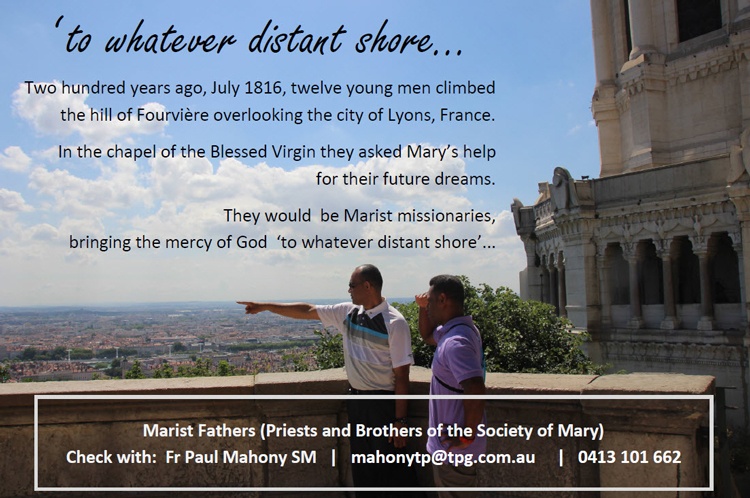Michael Fitzgerald SM writes:
Mary’s presence in the Church is not seen as a remote, nebulous, contemplative one, but rather Mary is in the Church with a particular mission: she is the gentle and merciful face of the Church, the open and welcoming door of the sheep-fold …. She extends the welcome of a merciful God, of a merciful, welcoming community of disciples. ….
Colin considered the mission of the Society he founded not to be the development of some new mode of devotion or the like, but to be itself the embodiment of Mary’s presence in the Church in the manner of its presence and in the manner of its way of acting. …. He was talking more of a movement. All the world would be Marist, even the pope, he would say. …. After all, Mary’s welcome is extended to everyone. What Colin is saying is that all are called to be welcomed into the community of disciples and to be disciples, and Mary is the perfect disciple, she is the way of being disciple. ….. (Michael Fitzgerald SM, “A Marian Consciousness” in Maristica, Textus et Studia, 5, 46.)
Fitzgerald continues:
Colin invites us first of all not to embark on new initiatives in the concrete sphere of pastoral ministry, but to imbue ourselves with a new consciousness and so discover new ways of being Church, of being disciple, of being present, of being pastor and evangeliser (Op cit, 48).
In the 1872 Constitutions we find a turn of phrase that is helpful. Marists are called to be “misericordiarum instrumenta” – “instruments of mercies”. The same phrase (in the singular) is used in the 1988 Constitutions – see #11. This phrase – “instruments of mercy” – reflects a central concern for Fr Colin:
In the Society we shall profess all those opinions which give greatest play to the mercy of God, on account of the great weakness of poor human nature, without however falling into a laxist theology (A Founder Speakers, 37,2).
Fr Colin was counter-cultural in promoting this emphasis on mercy. While it is central to the life and teaching of Jesus, it was terribly diminished amidst the moral rigorism that dominated France – and Australia – in the 19th century. A severe focus on law and doctrine side-lined the more Gospel-focus on people and relationships.
Fr Colin liked two expressions he had heard in Rome:
‘Law was made for man’. If I cannot save him with the law, I shall try to save him without it. (A Founder Speaks, 163,2). ‘Salvation before the law’. (A Founder Speaks, 95,3)
When the Marists began serving the people here at St Patrick’s in 1868, they immediately gained a reputation for mercy – especially in the confessional. One name stands out – Fr Pierre Piquet. After 56 continuous years working at St Patrick’s, he died in Lewisham Hospital on 10 August 1936. Peter McMurrich SM gives us an interesting note on Piquet’s time at St Patrick’s:
In 1907 he was suspended and declared excommunicated by the archbishop of Sydney, Cardinal Patrick Moran, for his carelessness in observing Church marriage regulations, and protocols for the administration of other sacraments. Although quickly smoothed over, the incident reflected the unease felt by some Irish clergy at the more liberal pastoral approach adopted by the French Marists, particularly in the confessional …. (See St Patrick’s web site)
Marists find a kindred spirit in Pope Francis. If there is one theme that has characterized his papacy, it is mercy. In his Easter Message – Urbi et Orbi – on March 31, 2013, Pope Francis said:
God’s mercy can make even the driest land become a garden, can restore life to dry bones (cf. Ez 37: 1-14) … Let us be renewed by God’s mercy, let us be loved by Jesus, let us enable the power of his love to transform our lives too; and let us become agents of this mercy, channels through which God can water the earth, protect all creation and make justice and peace flourish. (Emphasis added.)
